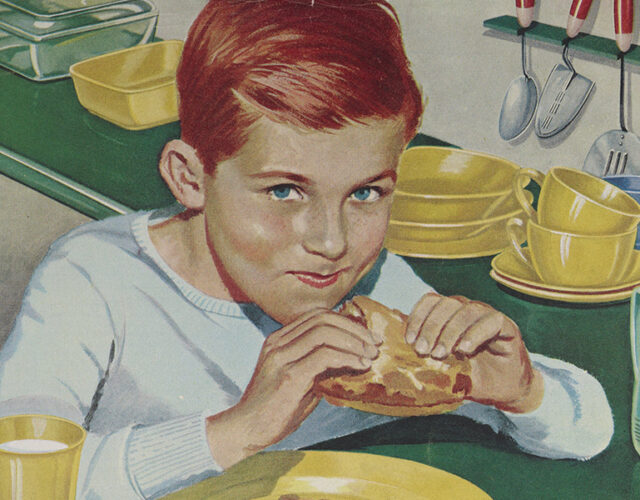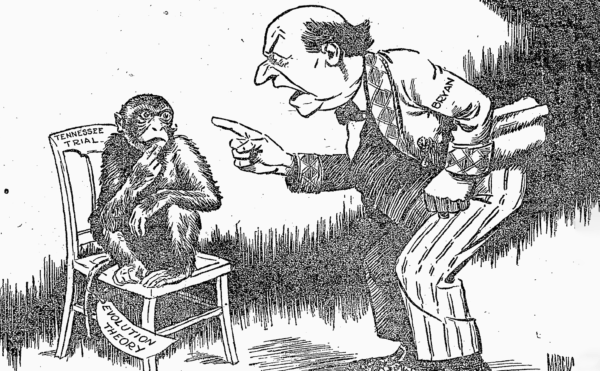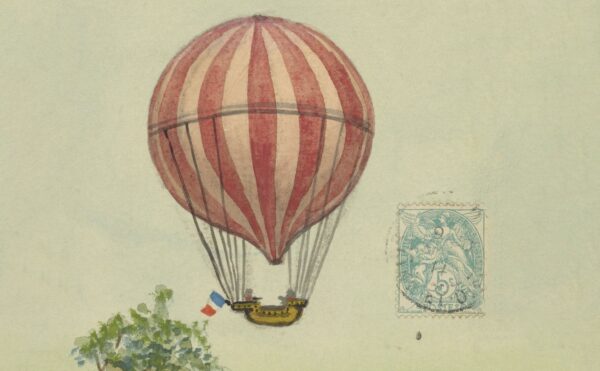If Ted Talks were around in the early 1900s, Horace Fletcher would have given his fair share of them. Fletcher was a health reformer who thought people didn’t chew their food nearly enough. He believed that most swallowed food way too quickly. This had all sorts of detrimental health consequences, he said, including nasty bowel movements. So he over-chewed his food. He once chewed a green onion 722 times before he let himself swallow it. His idea became such a sensation that it became a movement known as “Fletcherism.” His ideas made it to the White House and could have even changed the tide of World War I.
Credits
Host: Sam Kean
Senior Producer: Mariel Carr
Producer: Rigoberto Hernandez
Audio Engineer: Jonathan Pfeffer
Photo: Science History Institute
Transcript
In the early 1900s, a physiologist at Yale named Russell Chittenden got a nice surprise one day: a first-class package in the mail. Who doesn’t like getting a first-class package? So Chittenden tore it open and peeked inside.
It came from his friend, a health reformer named Horace Fletcher. And inside, Chittenden found what looked like a lump of rock, only softer. It was brown, with an odor like an old biscuit.
All of sudden, Chittenden realized what it was. There’s really no delicate way to put it: Horace Fletcher had mailed him a turd.
Now, this wasn’t some sick prank. Fletcher was completely sincere in mailing the turd. To him, it was proof that his strange new diet was working.
You see, Fletcher believed that human beings didn’t chew their food nearly enough—that we swallowed food way too early. Supposedly, this had all sorts of bad health consequences, including nasty bowel movements.
In contrast Fletcher chewed food like a maniac, grinding every bite into liquid pulp. He claimed this regimen helped him lose weight and gave him unlimited energy. It also, as he was eager to show Chittenden, produced completely dried-out poop.
Now, however nutty this all sounds, Fletcher’s overchewing was mostly harmless. But in one case, it almost had far bigger consequences.
Because in addition to being a health nut, Fletcher was also a prominent social reformer. And during World War I, he landed himself on a committee run by Herbert Hoover, to provide food relief to France and Britain.
In this role, Fletcher tried his damnedest to get those countries to adopt his fad diet. And if they’d listened to him, it might have upended World War I completely—and prevented the Second World War from ever happening…
From the Science History Institute this is Sam Kean and the Disappearing Spoon—a topsy-turvy science-y history podcast. Where footnotes become the real story.
Until age 40, Horace Fletcher led a charmed live. He joined a whaling expedition at age 15, and traveled through China and Japan. He then settled in San Francisco in the 1870s, and made a fortune importing Japanese trinkets and crafts.
After that, he became a bon vivant. He dressed in cream-colored suits, and ran an opera house in New Orleans. He soon became an art critic, and bought a thirteenth-century palazzo on the Grand Canal in Venice.
Then, came the greatest shock of his life. High living had done a number on his waistline. He stood five-seven, and had ballooned to 217 pounds. So when he applied for a life insurance policy at age 40, the insurance company rejected him. He was simply too fat to take a risk on.
Fletcher was shocked, not to mention embarrassed. He looked down at his sagging belly and wondered … how had he let himself go? He vowed to get healthier. And while it’s not clear where the idea came from, he finally hit upon his big solution—massively overchewing his food.
To be healthy, Fletcher insisted that you had to let food actually liquefy into a puddle of goo inside your mouth. Only then were you allowed to swallow. He would also spit out any so-called “sediment” that was left over. Just spit it right into his napkin, like a little child.
A mouthful of bread might take a few dozen chews to liquefy. But once, with a green onion, it took him seven-hundred-twenty-two chews before he let himself swallow. At one chew per second, that’s twelve straight minutes of masticating.
Now, ha, I tried this chewing experiment myself the other day. And… it did not go well. I couldn’t even hold food in my mouth that long without it dribbling onto my shirt. I encourage you all to try it at home and let me know what you think, but for me it was a failure.
So what was the purpose of all this chewing? Fletcher had the mistaken idea that digestion happens in your mouth, not your gut. So if you didn’t chew your food thoroughly, it would lodge in your intestines and block you up. He also claimed that overchewing food liberated more nutrients. So by chewing more, people could get by with eating far less food, and get more energy out of what they did eat.
Now, those notions are wrong. Digestion mostly happens in the gut, and you don’t need to chew your food that much to get nutrients. But you can see why the idea appealed to people in a folksy way.
Plus, there were some appealing parts of Fletcher’s diet. First, you could eat whatever the heck you wanted. Fletcher sometimes had chocolate candy for breakfast. But only a few pieces. He claimed he didn’t want more, since it took him several minutes to finish each bite. By then, it was just chocolate syrup spittle in his mouth.
The other reason that people tried Fletcher’s diet was his amazing physical transformation. After starting the diet, he dropped 42 pounds and lost seven inches off his waistline. He also had more energy that he knew what to do with.
Despite being middle-aged he began doing double backwards somersaults off the high dives at pools. He visited Yale and started hoisting college athletes over his head. He bicycled almost 200 miles on his 50th birthday. In truth, Fletcher had always been a gifted athlete, but he attributed all these amazing stunts to overchewing food.
Visiting Yale also put Fletcher in touch with scientists there—which is why he started sending them turds in the mail.
In fact, Fletcher was almost as obsessed with poop as he was with chewing. He only went number two twice per week, if that, and loved telling people how hard and dry it came out.
He didn’t call his turds “poop,” either. He called them “ash.” That’s because he thought his body had extracted every last bit of nutrition from them, just like fires extract every last bit of energy from wood and leave ash behind. He also claimed that his poop-ash smelled great—like a warm biscuit. I guess we’ll just have to take his word on that.
Now, however weird this all sounds, Fletcherism was pretty popular. He gave speeches by the dozen and had hundreds of thousands of followers, including—oil baron John Rockefeller; Sherlock Holmes creator Sir Arthur Conan Doyle; and novelist Upton Sinclair. Sinclair even coined a neat catchphrase for Fletcherism: “Nature will castigate those who don’t masticate.”
Beyond boosting people’s health, Fletcher also promised that his diet would remake American society. For starters, it would eliminate starvation and poverty, since people could get by with much less food by chewing it more.
And he had even bigger plans for international reforms. He definitely would have appeared at a few “ideas festivals” nowadays. Inevitably, then, he got invited to join the international food relief movement during World War I.
The big focus for this relief movement was Belgium. Belgium had been overrun by Germany early in the war, leaving millions starving. And the relief efforts for this crisis were led by future U.S. president Herbert Hoover.
Now, obviously Hoover has a less-than-stellar reputation nowadays. But however bad a president, Hoover truly was an impressive guy.
He was orphaned at age nine in Iowa, and found himself penniless and alone. He nevertheless got into Stanford University later, and put himself through school waiting tables and running his own laundry service.
Hoover studied engineering at Stanford, then went into international mining. He once found a hoard of silver in China by following an actual, gosh-darn treasure map. He was worth four million dollars by age 40, which is a hundred million dollars today.
After making his pile, Hoover turned to public service, and tried to save Belgium. By all accounts, he did a magnificent job. Some historians estimate that, between this and later food-relief programs he ran, Hoover saved more people from starvation than anyone in history.
But, Hoover did have a blind spot. He had a scientific background, and he was a sucker for any arguments that sounded vaguely scientific. Which is why he fell for Horace Fletcher.
Now, there’s no evidence that Hoover himself started overchewing food. But Hoover did emphasize the need to stretch food supplies and get by with less. And Fletcher’s ideas dovetailed perfectly with that. Hoover even appointed Fletcher to his relief commission as the “official food economist.” He then let Fletcher prattle on and on about how people in Belgium could avoid if they’d just chew their food more. Make every bite count, he said.
Unfortunately, Fletcher soon overplayed his hand. After visiting Belgium, he told one newspaper that his chewing reforms there had been so successful that, quote, “undertakers are literally out of work.” This was obvious baloney, and after that, Fletcher’s influence declined sharply.
At least his direct influence. You see, Hoover did such a good job with Belgium that in 1917 President Woodrow Wilson put Hoover in charge of food relief for all the Allies of World War I, including France and Britain. And one of the main consultants Hoover relied on here was Yale physiologist Russell Chittenden.
Now, despite getting turds in the mail from him, Chittenden was wildly devoted to Fletcher’s ideas. So when Hoover sent Chittenden to Europe in 1918 to convince the Allies to get by with less food, Chittenden once again took up Fletcher’s rallying cry. Just make people chew their food more. Bye-bye starvation, hello poop-ash.
As you can imagine, European leaders were dumbfounded by Chittenden’s plan. They already saw Americans as bumpkins, and this fad diet seemed outright bonkers.
In response, Chittenden explained about all Fletcher’s feats of strength, like lifting Yale boys over his head. He also cited studies on other people who had adopted the diet and shown similar transformations in the lab.
But the Europeans cut him off. Those are volunteers, they pointed out, chewing food in a nice warm lab for a few weeks. Our people have been hungry for years, and they’re working outdoors in the cold. If we adopt your plans, we’ll lose the war. To hell with your Yankee food fads!
Now, this is a pretty cogent critique of the difference between lab-science and real-world applications. They don’t always translate so neatly, and thinking through why they might not is a great lesson for any scientist.
But what I really find intriguing here are the historical what-ifs. After all, the ultimate decision here was still Hoover’s. He could have pressed Fletcherism on Europe if he wanted. After all, wasn’t it scientific?
But, sensing resistance, he backed down, which was probably wise. Again, you don’t get more calories out of food by chewing more. And Chittenden’s plan probably would have doomed the Allies and given Germany the upper hand. Instead, the Allies ate well and won the war.
Coincidentally, Fletcher died shortly after the war ended, in 1919. And with his death, his ideas fell into obscurity.
But honestly, I admit I have a soft spot for old Horace. He was a sincere guy. And if we can get past the kooky parts of his work—like chewing onions hundreds of times, and pooping into envelopes—it does have a few things going for it.
For one thing, we would all benefit from chewing our food more instead of bolting down meals. Food tastes better if you actually, you know, taste it.
Chewing food more would also slow us down during meals, which is important. When you’re full, your stomach sends signals to your brain to put down that last taco or whatever. But those signals take time to crawl from the stomach up to the brain.
So if you eat too fast, you’ll keep piling food in after you’re full and overshoot. Whereas if you slow down and chew, you’ll eat less and be more satisfied.
Plus, you might remember another benefit of chewing that I mentioned a few episodes ago. Chewing more gives you a bigger, stronger jaw, which means less crowded teeth and less restricted airways. Overall, Fletcher was wrong about the details, but chewing more can benefit you a lot.
There are also some fascinating connections between Fletcherism and modern discoveries about digestion. Again, Fletcher believed that all digestion happens in the mouth. That isn’t correct, but human beings do have special DNA that make our saliva different from other animals’ saliva. And believe or not, that special DNA got inserted into our genomes by viruses, during a pandemic viral invasion.
It sounds crazy, but I’ve laid out the details of this viral invasion in a bonus episode at Patreon.com/disappearingspoon. The bonus episode also gets into the hard-hitting, investigative question that I know you’ve been wondering this whole time. Which is—Wasn’t it illegal for Horace Fletcher to mail poop to people? I’ve done the hard work of researching this, and the answer … might surprise you. All that and more at Patreon.com/disappearingspoon.
Now, Horace Fletcher’s ideas never became official policy anywhere, except among the gullible in the United States. But sometimes I like to imagine what history would have been like if they had.
After all, he wasn’t some marginal figure. He had Herbert Hoover’s ear. Although honestly, if Hoover had listened to Fletcher, his food-relief programs probably would have failed.
And considering that Hoover used those programs as a springboard into politics, Fletcher might well have submarined Hoover’s chances of becoming president. Someone else would have been sitting in the White House when the Great Depression struck. Would things have gone better in that case? They hardly could have gone worse.
European politics might have changed completely, too. Had Fletcher gotten his way and forced European soldiers and farmers to chew more, Germany might have turned the tables on the Allies and won the war—or at least driven things to a stalemate. In turn, this would have given Germany far more leverage during the negotiations at the end of the war.
And if we really want to stretch things, well, maybe Germany could have then sidestepped the crushing reparations that fueled so much resentment over the next twenty years—and led directly to the rise of Adolf Hitler and Nazism. It’s conceivable, then, that if Horace Fletcher gotten his way, World War Two might never have happened.
All those word-historical changes, arising from a now-forgotten health fad. I’m not going to make the obvious joke here—that it’s a lot of food for thought. But it’s certainly something to chew over.





